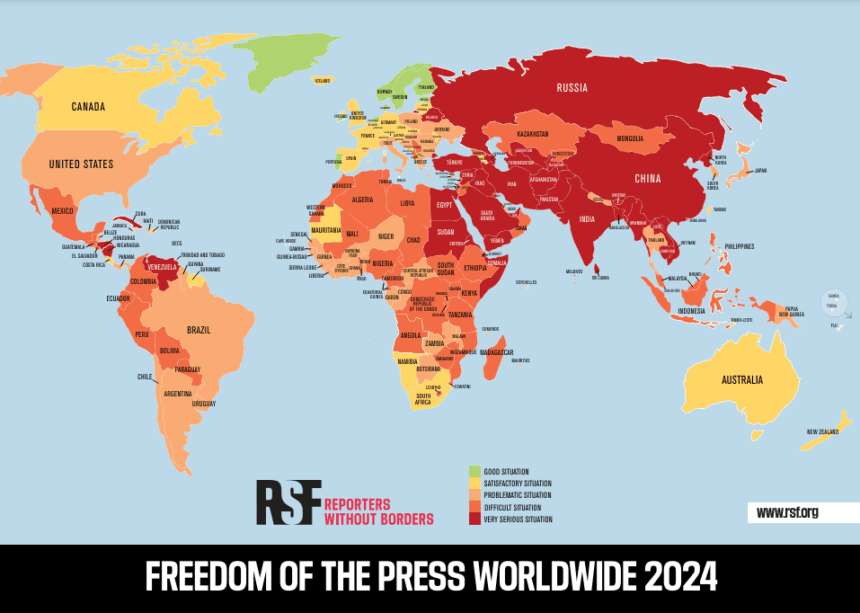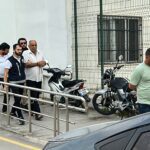Turkey was ranked 158th out of 180 countries in the 2024 World Press Freedom Index by Reporters Without Borders (RSF), while the organization reported the number of imprisoned journalists in the country at seven, far below what local and international rights groups report.
Turkey’s 2024 ranking on the RSF index is up from 165th last year; however, according to RSF the minor change for the better is not a result of the improvement of freedom of the press in the country but rather due to regression elsewhere.
Rights groups routinely accuse the Turkish government of trying to keep the press under control by imprisoning journalists, eliminating media outlets, overseeing the purchase of media brands by pro-government conglomerates and using regulatory authorities to exert financial pressure, especially since President Recep Tayyip Erdoğan survived a failed coup in July 2016.
Since the failed coup, when journalists were subjected to mass arrests on bogus coup or terrorism charges, local and international press organizations release varying figures for the number of journalists jailed in the country.
According to a census from the Expression Interrupted Platform, there are currently 32 journalists in prison in Turkey, mainly comprising Kurdish journalists and those who worked for media outlets affiliated with the Gülen movement.
The faith-based Gülen movement is accused by the Turkish government of masterminding a failed coup in July 2016 and is labelled as a terrorist organization. The movement, inspired by the views of Islamic scholar Fethullah Gülen, strongly denies the accusations.
According to Turkey’s leading press union, the Journalists’ Union of Turkey (TGS), in the past year, 69 journalists were detained and 264 stood trial. Sixty-three were acquitted, while 36 verdicts against journalists resulted in a total of 55 years in prison.
Turkish Minute tried to contact RSF’s Turkey representative, Erol Önderoğlu, for a comment on the low number of imprisoned journalists reported by his organization, but was unable to reach him.
According to RSF, Erdoğan’s re-election in May of last year is a source of concern as the country continues to lose points in the index.
The index is calculated using a score from 0 to 100, where 100 represents the highest level of press freedom and 0 the lowest. This score is derived from both a quantitative tally of abuses against media and journalists and a qualitative analysis by press freedom experts, who respond to an RSF questionnaire available in 24 languages.
The questionnaire evaluates five key indicators: political context, legal framework, economic context, sociocultural context and safety. These indicators provide a comprehensive view of the various challenges and threats journalists face.
The press freedom map visualizes these scores, categorizing countries into five groups based on their scores: good (green, 85-100 points), satisfactory (yellow, 70-85 points), problematic (light orange, 55-70 points), difficult (dark orange, 40-55 points) and very serious (dark red, 0-40 points).
Each country’s overall score is determined by subsidiary scores for each of the five contextual indicators, which are weighted equally. Within each indicator, all questions and subquestions also have equal weight.
Political context (33 questions and subquestions) examines the level of media autonomy, the acceptance of varied journalistic approaches and the support for media’s role in holding the government accountable.
Legal framework (25 questions and subquestions) assesses the freedom of journalists to work without censorship or judicial sanctions and the protection of journalists’ rights to access information and protect their sources.
Economic context (25 questions and subquestions) evaluates economic constraints imposed by government policies, non-state actors like advertisers and media owners who might use their platforms to promote personal business interests.
Sociocultural context (22 questions and subquestions) looks at social and cultural constraints that affect media coverage, including issues of gender, ethnicity and cultural pressures not to challenge powerful entities.
Safety (12 questions and subquestions) focuses on the physical and psychological safety of journalists, including risks of violence, harassment and professional harm.
The RSF index for 2024 ranks Turkey 158th out of 180 countries with an overall score of 31.6, which is a deterioration compared to the 2023 score (33.97), remaining in the “very serious” category.
The analysis for 2024 shows a significant decline in the political indicator, which falls from a score of 36.56 in 2023 to 20.02, putting Turkey in 165th place in this category.
The economic context remains relatively stable, changing slightly from 29.41 in 2023 to 28.91. The legal framework score has fallen from 41.16 to 37.38. In contrast, there are slight improvements in the sociocultural context and safety indicators, with the former rising from 30.11 to 37.05 and the latter from 32.58 to 34.63.
According to RSF, biased public broadcasting during the election period, the arrest of dozens of journalists and impunity are developments that make Turkey one of the countries regressing the most in terms of “political” factors affecting the media.
The investigations and prosecutions conducted against journalists on accusations of “disinformation” following earthquakes in February 2023 are signs that things are not going well in terms of the legal framework, according to the organization.
Turkey was accordingly among the countries in the Eastern Europe and Central Asia (EECA) region that saw the most serious decline in the political context.
Bunyamin Tekin
Source: Turkish Minute



